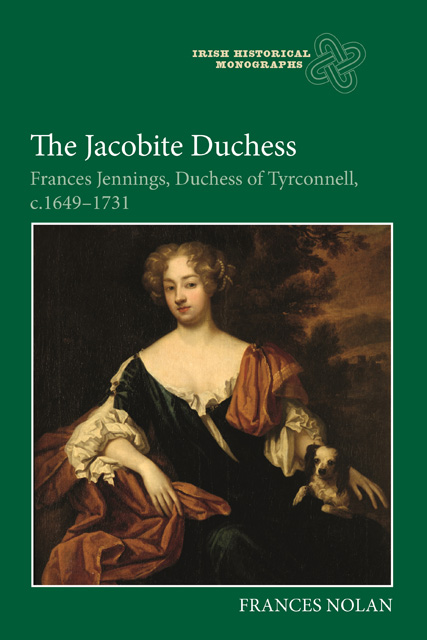Book contents
- Frontmatter
- Dedication
- Contents
- List of illustrations
- Acknowledgements
- List of abbreviations
- Notes on the text
- Introduction
- 1 ‘The malicious little gipsy’: Early life, c.1649–65
- 2 ‘Hambleton is now going into France’: Marriage, motherhood and migration, 1666–76
- 3 ‘Ruined beyond redemption’?: Widowhood, remarriage and returning, 1676–86
- 4 ‘That caballing humour’: A political woman, 1687–90
- 5 ‘Every one’s eye is watching’: Treason, forfeiture and exile, 1691–99
- 6 ‘Always a plane dealor’: Changing fortunes and life in the Low Countries, 1700–08
- 7 ‘A duchess-nun’?: Family, faith and finance in old age, 1708–30
- 8 ‘Albion’s fairest plant’: Death and legacy, 1731
- Appendix A: Duchess of Tyrconnell’s family tree
- Appendix B: Books in the possession of the duchess of Tyrconnell in Dublin, transported from her apartment in the Château de Saint-Germain-en-Laye
- Appendix C: David Nairne’s ‘Cyffer w[i]th the D[uche]sse of Tyrconnel, 5th August 1702’
- Bibliography
- Index
- Irish Historical Monographs previous volumes
8 - ‘Albion’s fairest plant’: Death and legacy, 1731
Published online by Cambridge University Press: 04 January 2024
- Frontmatter
- Dedication
- Contents
- List of illustrations
- Acknowledgements
- List of abbreviations
- Notes on the text
- Introduction
- 1 ‘The malicious little gipsy’: Early life, c.1649–65
- 2 ‘Hambleton is now going into France’: Marriage, motherhood and migration, 1666–76
- 3 ‘Ruined beyond redemption’?: Widowhood, remarriage and returning, 1676–86
- 4 ‘That caballing humour’: A political woman, 1687–90
- 5 ‘Every one’s eye is watching’: Treason, forfeiture and exile, 1691–99
- 6 ‘Always a plane dealor’: Changing fortunes and life in the Low Countries, 1700–08
- 7 ‘A duchess-nun’?: Family, faith and finance in old age, 1708–30
- 8 ‘Albion’s fairest plant’: Death and legacy, 1731
- Appendix A: Duchess of Tyrconnell’s family tree
- Appendix B: Books in the possession of the duchess of Tyrconnell in Dublin, transported from her apartment in the Château de Saint-Germain-en-Laye
- Appendix C: David Nairne’s ‘Cyffer w[i]th the D[uche]sse of Tyrconnel, 5th August 1702’
- Bibliography
- Index
- Irish Historical Monographs previous volumes
Summary
As with her reputed life of piety in Dublin, the duchess of Tyrconnell’s death has become a central but erroneous feature of her biography. It appears that it was Horace Walpole who first attributed her death to a fall, in the middle of the night. Walpole described her as being ‘of very low stature and extremely thin’ at the time of her death, remarking that ‘she had not the least trace in her features of having ever been a beauty’. He claimed that on falling, she was too feeble to get back up or to cry out and that she perished, alone. In fact, the 82-year-old Frances died at 1am on 7 March 1731, and in the hours surrounding her death she was attended by a surgeon and a nurse, by some of her family, and by members of the legal profession. All of the extant accounts indicate that, although she was physically feeble, she was alert and lucid in her interactions until her very last hour on earth. The population of her final days reveals much about her interior world: her faith, her material life, and the dynamics at play within her family.
The disputes that arose following the duchess of Tyrconnell’s death were born of the ill-feeling between her and her daughters Dillon and Kingsland, which had bubbled for years and bled through different branches and generations of their family. Consequently, most surviving accounts of Frances’s death come from those who had something material to gain from it, so objectivity is lacking and the facts are often fudged, or at least massaged into a more palatable ‘truth’. As with much of Frances’s later life, the report on her final illness comes from her daughter Dillon, who recounted that her mother ‘fell ill the munday beffore of a violent cold which fell on her Longs & could not spitt, complained of a paine in her side and had a fevour along with it, butt had been very unwell ever since Christmass’. This bout of ill-health prompted her to leave her house in Grafton Street at the beginning of January 1731. Moving to smaller lodgings, she dismissed her servants and sent away her granddaughter, Frances Barnewall, although Lady Dillon believed that this latter action was less about a lack of space and more that ‘her minde was changed’ as to the young woman.
- Type
- Chapter
- Information
- The Jacobite DuchessFrances Jennings, Duchess of Tyrconnell, c.1649-1731, pp. 192 - 209Publisher: Boydell & BrewerPrint publication year: 2021

